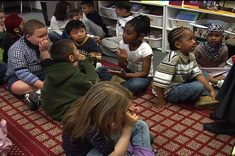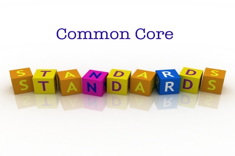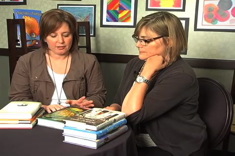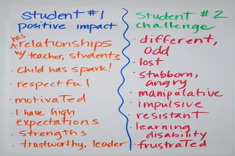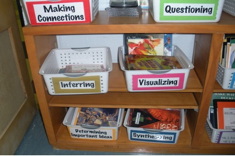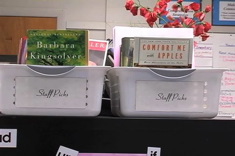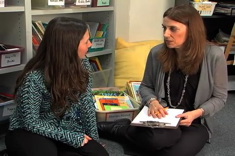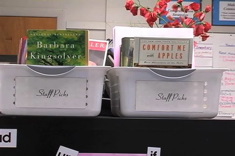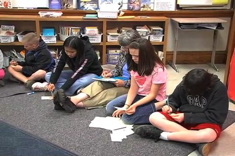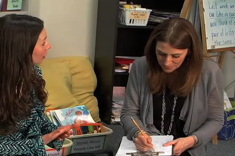Literacy Coaches
A simple question - who will coach the coaches? If you're a literacy coach, you already know there is no job more amazing or overwhelming in a school. Our Choice Literacy library includes a small sample of our resources for literacy coaches. If you work as a coach, you'll want a subscription that includes access to our Leaders Lounge, where there are over 900 resources for coaches, including study group protocols, videos of demonstration lessons, and guides for designing coaching cycles.
Latest Content
Whole-Group Share Sessions in Literacy Workshops: Essential Elements
Tammy Mulligan and Clare Landrigan found that even though the group share is the shortest part of the workshop, teachers reported many issues that needed attention. These issues can be resolved with attention to the framework, modeling and more.
Ubiquitous Venns, Watch Fors, and Leverage Points: Coaching for Depth
Heather Rader examines the use of Venn diagrams as a catalyst for thinking about how to coach for more depth in classrooms.
Common Core Conversations: The Half ‘n’ Half Shift for Nonfiction Reading and Writing
Colleagues and coaches, Amanda Adrian and Heather Rader, explore the upcoming shifts in English Language Arts and anticipate what it will mean for leaders, teachers and most importantly, students.
Not That Into Me
If you're a literacy coach, those teachers who don't want to work with you can make you feel like the wallflower at the prom or the last kid picked for the basketball team. Heather Rader has positive, proactive suggestions for making the best of an awkward situation.
Best Practices All Day Long: Balancing Personal and Professional Success
If you’ve ever experienced that disequilibrium of feeling completely organized in your professional life, and hopelessly scattered during your personal time, you’ll enjoy Melanie Quinn’s reflective essay.
The Power of Linking Words and Perceptions
Melanie Quinn relays a powerful practice for staff members to reframe language and perceptions while putting common labels for students in a whole new light.
Rethinking Mentor Texts
Shari Frost writes about the ways our perfectly organized bins may limit the teaching possibilities for many books. She takes readers step by step through her process of determining ways to use a sample mentor text to teach a multitude of lessons and strategies.
Virtual Book Clubs for Teachers
It’s virtually possible to get together around a book without getting together at all. Shari Frost shows us how.
Getting the Most Out of Visiting a Colleague’s Classroom (PODCAST)
Tammy Mulligan and Clare Landrigan talk with Franki Sibberson about strategies for getting the most out of observing in a colleague’s classroom.
Big Ideas: Balancing Plans with Authentic Response
Clare Landrigan and Tammy Mulligan learn important lessons about planning, themes, and life when they share Knuffle Bunny with a group of kindergartners.
Virtually Coaching a Lesson
Coaching cycles look different depending on teachers' needs. Via email and phone, Heather Rader has professional conversations with a teacher as he plans and designs a lesson for observation.
An Attitude of Gratitude
Heather Rader gets three nasty emails, and thinks through how to hold on to an attitude of gratitude when dealing with colleagues who are short-tempered or demanding.
Transitioning to Guide on the Side: Facilitating Collaborative Scoring
Heather Rader wants to transition to more of a guide-on-the-side role as she coaches colleagues. Here are some simple strategies she uses to move offstage during collaborative scoring workshops.
Calendaring a Literacy Coach
The joy and challenge of literacy coaching is creating a good structure for the day. Heather Rader has suggestions for short- and long-term planning on the coaching calendar.
Building the Reading Community Among Teachers
Jennifer Allen shares a few strategies for building the reading community beyond individual classrooms in your school. Book swaps, a shared staff novel, and family literacy breakfasts all reinforce the most important aspect of reading – it should be pleasurable and engrossing, no matter the age of the learner.
Balancing Assessments Through Better Classroom Notes
Clare Landrigan and Tammy Mulligan explain how literacy coaches can validate and support teachers by helping them refine their classroom notetaking skills.
The Email Mirror and Literacy Coaching
Are you a minimalist when it comes to email, or do you tend to send rambling and reflective posts? No matter your email style, it likely is a match for some of your colleagues, and a barrier to communication for others.
Math, Writing, and Coaching to Learn
Heather Rader works with a 5th grade teacher to infuse more writing into her math curriculum.
Creating a Coaching Schedule
Tammy Mulligan and Clare Ladrigan give advice on creating schedules for literacy coaches that integrate district goals and teacher interests.
Daily Tidbits: Professional Development in Small Bites
Jennifer Jones suggests an easy way to provide bits of useful professional development to colleagues.
Still Revising After 10 Years: Sorting Through Pitfalls of Study Groups
Jennifer Allen considers how her study groups have changed over the past decade as she continues to balance district demands with teacher choice.
Portable Anchor Charts for Literacy Coaches
Jennifer Allen explains the many uses of portable lightweight anchor charts in her work as a literacy coach.
Injecting Writing into Everything: Bringing the Outside In
Heather Rader helps a 3rd grade teacher break through the resistance of some student writers. The magic tool? A dirty onion from the garden.
What Velcro Can Do: Science, Literacy and Coaching Connections
No time for science? Don’t like messes? Heather Rader works with a teacher and helps her find a way to fit science neatly into her full teaching day.
Helping Children Build Notetaking Skills
Whose job is it to teach notetaking skills? Heather Rader finds teachers often expect colleagues in previous or subsequent grades to teach these skills, as well as a lot of hesitancy about how best to instruct students. She presents a simple notetaking template and describes how she uses it to help students learn how to list important details with words and images.
Ways to Avoid Coaching Traps
There are many traps for new literacy coaches that are rarely discussed. Clare Landrigan and Tammy Mulligan share the most common four they try to avoid.
Language Patterns: Reflecting with Transcripts and Wordle
If you are familiar with Wordle, you already know it is a great free tool on the web for creating “word clouds” – visual representations of language. Heather Rader uses Wordle in her literacy coaching to give new and veteran teachers a succinct and powerful visual representation of their teaching language.
Supporting Successful First-Year Coaches
Heather Rader gets the inside word from novice literacy coaches about the support they need to thrive.
Quick and Thorough: Literacy Coach Conferring Notes
Jennifer Jones finds in a time of budget cuts it is more important than ever for literacy coaches to keep good records of how they spend their time with teachers. She shares a very simple spreadsheet system which includes content codes and brief notes.
Tips for Conducting Demonstration Lessons, or How to Avoid the “Am I Doing This Right?” Question
Clare Landrigan and Tammy Mulligan have advice for teachers and literacy coaches leading demonstration lessons.
Browse Content By
Type
Category
- Assessment Tools
- Big Fresh Archives
- Booklists
- Choice Numeracy
- Classroom Design
- Common Core
- Community Building
- Conferring
- Content Literacy
- Digital Literacy
- English Language Learners
- Equity
- Family Relations
- Free Samples
- Guiding Groups
- Leadership
- Literacy Coaches
- Mentor Texts
- Minilessons
- New Teacher Mentors
- Podcasts
- Poetry
- Quote Collections
- Reading Strategies
- Self Care
- Struggling and Striving Learners
- Talking and Listening
- Teacher Study Groups
- Teaching Reading
- Teaching Writing
- Word Study and Vocabulary
Author
- Melissa Quimby
- Nawal Qarooni
- Gwen Blumberg
- Julie Cox
- The Lead Learners
- Hannah Tills
- Josie Stewart
- Ruth Metcalfe
- Mallory Messenger
- Becca Burk
- Jodie Bailey
- Vivian Chen
- Mary Brower
- Tiffany Abbott Fuller
- Stephanie Affinito
- Ruth Ayres
- Leigh Anne Eck
- Heather Fisher
- Shari Frost
- Julie Johnson
- Suzy Kaback
- Gigi McAllister
- Shirl McPhillips
- Melanie Meehan
- Cathy Mere
- Debbie Miller
- Tara Barnett and Kate Mills
- Tammy Mulligan
- Dana Murphy
- Bitsy Parks
- David Pittman
- Brenda Power
- Heather Rader
- Matt Renwick
- Mandy Robek
- Christy Rush-Levine
- Gretchen Schroeder
- Jen Schwanke
- Brian Sepe
- Katherine Sokolowski
- Stella Villalba
- Jennifer Vincent
Grade Level
Choice Literacy Membership
Articles
Get full access to all Choice Literacy article content
Videos
Get full access to all Choice Literacy video content
Courses
Access Choice Literacy course curriculum and training

